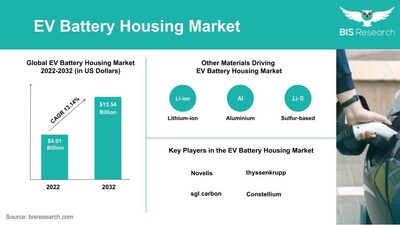FREMONT, Calif., Jan. 3, 2024 /PRNewswire/ — The automotive industry is witnessing a significant shift in consumer preferences driven by the increasing prevalence of electric vehicles (EVs) globally. Environmental concerns are steering consumers toward sustainable transportation, leading to a notable surge in EV adoption. According to the International Energy Agency’s EV Outlook 2023, “EV sales jumped from around 1 million to more than 10 million from 2017 to 2022. The share of electric cars in total car sales jumped from 9% in 2021 to 14% in 2022, more than 10 times their share in 2017.”

Governments are incentivizing electric mobility, prompting automakers to invest in battery materials, technology, and charging infrastructure innovation. The choice of battery significantly impacts an EV’s driving range. According to the Department of Energy, U.S., since the rolling out of the Inflation Reduction Act, over $35 billion in investment in the EV production, battery, and critical mineral industries has been announced. Moreover, over 140 new or expanded sites have been established for EV assembly and EV component or charger manufacturing.
In August 2023, General Motors (GM) announced an investment of $60 million in Mitra Chem, an AI-enabled battery materials manufacturer based in Silicon Valley. The collaboration aims to develop advanced iron-based cathode active materials (CAM), such as lithium manganese iron phosphate (LMFP). These materials are intended to power affordable and accessible electric vehicle (EV) batteries that align with General Motors’ EV propulsion architecture, known as the Ultium Platform.
Understanding EV Batteries from Production to Power
The EV battery manufacturing process begins with extracting and processing raw materials such as lithium, nickel, and cobalt. Mining operations extract these elements, which undergo refining processes to meet the stringent specifications required for battery production.
The processed materials are transformed into cathodes, anodes, and electrolytes through intricate manufacturing procedures. Assembly lines then integrate these components into battery cells, with sophisticated quality control measures ensuring optimal performance and safety. The final stage involves incorporating these cells into battery packs, ready for installation in electric vehicles.
Battery manufacturing equipment is pivotal at various levels, including electrode manufacturing, cell assembly, and cell finishing. Specialized machinery ensures precision and efficiency in crafting battery components. With the increasing demand for EV batteries, the manufacturing process has also picked up pace, leading to growth in the market for battery manufacturing equipment. The market for battery manufacturing equipment is projected to reach $88.09 billion by 2031.
Amongst battery materials, lithium-ion-based batteries are the most popular, with the highest energy density (250-400 Wh/kg) and an extended life span. Notable users include Tata, Tesla, and Porsche, driving the lithium-ion battery metals market to a whopping $286.08 billion valuation by 2031.
Moreover, sodium-based batteries have gained market traction and may be competitive with lithium-ion batteries in the future. With operational temperatures from -30°C to 60°C, sodium-ion batteries exhibit superior safety compared to lithium-ion batteries, enhancing thermal resilience against various battery chemistries. Sodium-ion batteries can be discharged to zero volts as a precautionary measure during transportation, reducing shipping costs.
Forecasts indicate that the global sodium-ion batteries market is expected to surge from $528.0 million in 2021 to $4,368 million by 2031, with a CAGR of 25.91% from 2022 to 2031.
Advances are now focused on safety and durability, with emerging technologies such as solid-state and lithium-sulfur batteries showing promise. Solid-state batteries replace liquid electrolytes, providing enhanced safety and potentially higher energy density, although commercial availability of these batteries is still pending. Lithium-sulfur batteries promise greater energy density but face cycle life and flammability challenges, still in early developmental stages. The global sulfur-based battery market is predicted to reach $2.66 billion by 2031.
How to ensure safety, performance, and longevity in EVs?
The successful integration and management of electric vehicle (EV) batteries and the associated charging infrastructure are crucial elements for the widespread acceptance of electric vehicles.
Various charging options, customized to meet diverse needs, highlight the commitment to upholding high standards in safety, performance, and overall durability. In a notable development in August 2023, LOHUM collaborated with Vecmocon, an Indian EV intelligence company, to enhance the supervision of EV battery lifecycles.
The complexities of electric vehicle battery management involve a comprehensive approach that includes monitoring and regulating battery packs to ensure optimal safety, performance, and lifespan. The battery management system (BMS), an advanced electronic system with versatile functionalities, is at the core of this process. These functionalities encompass vigilant monitoring of battery parameters such as voltage, current, temperature, and state of charge (SOC). The BMS also coordinates battery thermal management strategies to keep the battery pack within a secure temperature range.
Moreover, refrigeration components are also installed to ensure proper functionality of battery thermal management. The refrigeration components include condensers, evaporators, and cooling plates. Along with these components, EVs are now fitted with immersion cooling systems containing cooling fluids such as mineral oils, synthetic oils, and esters.
Future of Electric Vehicles
With the rising demand for lightweight vehicles, electric vehicle battery manufacturers are channeling investments into structural adhesives, replacing traditional mechanical fasteners. This strategic shift enhances structural integrity and significantly reduces overall vehicle weight, thereby contributing substantively to the increasing global market. The structural adhesives and sealants for EV batteries market is projected to reach $305.5 million in 2031.
Moreover, automotive original equipment manufacturers (OEMs) are invested in fitting adequate insulation in their electric vehicles to improve the driving experience, which, in turn, can increase electric vehicle sales.
About BIS Research
BIS Research is a global B2B market intelligence and advisory firm focusing on deep technology and related emerging trends, which can soon disrupt market dynamics. We publish over 200 market intelligence studies annually, focusing on several deep technology verticals.
Our strategic market analysis emphasizes market estimations, technology analysis, emerging high-growth applications, deeply segmented granular country-level market data, and other important market parameters useful in the strategic decision-making for senior management.
BIS Research offers syndicated and custom studies and expert consultations to firms, providing them with specific and actionable insights on novel technology markets, business models, and competitive landscapes.
Contact
Head of Marketing
Email: [email protected]
BIS Research Inc.
39111 PASEO PADRE PKWY STE 313,
FREMONT, CA 94538-1686
Visit our Blog @https://bisresearch.com/insights
Get Expert Insights @ https://community.insightmonk.com
Connect with us on LinkedIn @ https://www.linkedin.com/company/bis-research
Connect with us on Twitter@ https://twitter.com/BISResearch
Photo: https://mma.prnewswire.com/media/2310141/EV_Battery_Housing_Market.jpg
Logo: https://mma.prnewswire.com/media/2282886/4476005/BIS_Research_Logo.jpg

![]() View original content:https://www.prnewswire.co.uk/news-releases/ev-battery-materials-and-related-technologies-set-to-fuel-the-electric-vehicle-battery-market-to-93-94-billion-by-2026-bis-research-302025194.html
View original content:https://www.prnewswire.co.uk/news-releases/ev-battery-materials-and-related-technologies-set-to-fuel-the-electric-vehicle-battery-market-to-93-94-billion-by-2026-bis-research-302025194.html

Featured image: Megapixl © Bandit2523









